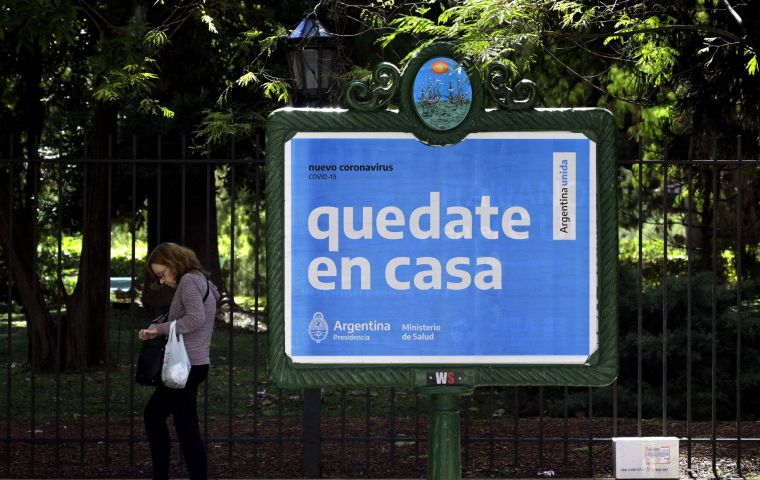MercoPress. South Atlantic News Agency
All but South African coronavirus strains circulating in Argentina's community
 The 501Y.V1 (UK) variant is on its way to prevail over all the other versions of covid-19 in Argentina
The 501Y.V1 (UK) variant is on its way to prevail over all the other versions of covid-19 in Argentina Argentina's Science Ministry Monday confirmed community circulation of the Manaus strain in the country had been established. The new variant is said to be more contagious and others also dare suggest it is even more lethal. Of the various Sars-CoV-2 strains known to science, only the South African one remains to be spotted in the country.
If current projections stay unchanged, the UK variant -also known as 501Y.V1- could become dominant in the coming weeks, as in Europe and the United States, health authorities added.
The Ministry of Science, Technology and Innovation confirmed cases of the United Kingdom, Manaus, Rio de Janeiro and California variants had been detected in the country without an epidemiological link or close contact with travellers.
The authorities have insisted on the importance of preventive measures (physical distancing, ventilation of environments, frequent hand washing, wearing masks, etc.) until vaccines become available for the entire population, particularly the elderly and those at higher risk with other diseases.
“In the case of the United Kingdom variant, an increase in the frequency of detection is observed week by week from the beginning of its detection,” the Science Ministry said in a statement. There are four variants of epidemiological relevance that were detected in Argentina which correspond to cases of infections acquired in the community or of unknown origin: variant 501Y.V1 (United Kingdom), variant 501Y.V3 (Manaus), variant P .2 (Rio de Janeiro) and variant CAL.20C (lineage B.1.427, California).
The ministry's PAIS Project Consortium relesed its data based on 297 samples of people infected by SARS-CoV-2 residing in the Autonomous City of Buenos Aires and the Province of Buenos Aires, with no history of having traveled abroad, and of 16 samples of Córdoba, which were indeed related to Argentine tourists returning home or to close contact among community members.
All samples were obtained between February 1 and March 15, 2021. Some of the detected cases of the variants 501Y.V1 (United Kingdom), 501Y.V3 (Manaus) and CAL.20C (California) correspond to individuals with no travel history or close contact with travelers, which accounts for community circulation.
The 501Y.V1 variant (United Kingdom) was detected in 16 cases (13 from the Federal Capital and three from the west of the Greater Buenos Aires area) . Three of these cases correspond to close contacts of the reported cases, while the other ten correspond to cases of acquisition in the community. ”An increase in the detection frequency of the 501Y.V1 (UK) variant was observed in the AMBA (Buenos Aires Metropolitan Area) during the last epidemiological weeks,” the ministry said.
In the province of Córdoba, six cases of the 501Y.V1 variant (United Kingdom) were detected, of which four have a travel history and two are close contacts of these.
There were also 35 cases of the Rio de Janeiro (P.2) variant which were confirmed through a whole genome sequencing and phylogenetic analysis. Of these, only one had a travel history, and the rest correspond to cases of community circulation.
Regarding the Californian version of the coronavirus, two of these cases, the CAL.20C variant (lineage B.1.427, California) were identified from whole genome sequencing, one of them from the City of Buenos Aires. In another 36 cases, S_L452R / Q mutations were detected, which are still under analysis.
Active surveillance of these variants was carried out by the Argentine SARS-CoV-2 Genomic Consortium, through the sequencing nodes of the Virology Laboratory of the Ricardo Gutiérrez Children's Hospital (CABA), of the UGB-INTA Laboratory (Castelar) and the Central Laboratory of the City of Córdoba.




Top Comments
Disclaimer & comment rulesCommenting for this story is now closed.
If you have a Facebook account, become a fan and comment on our Facebook Page!